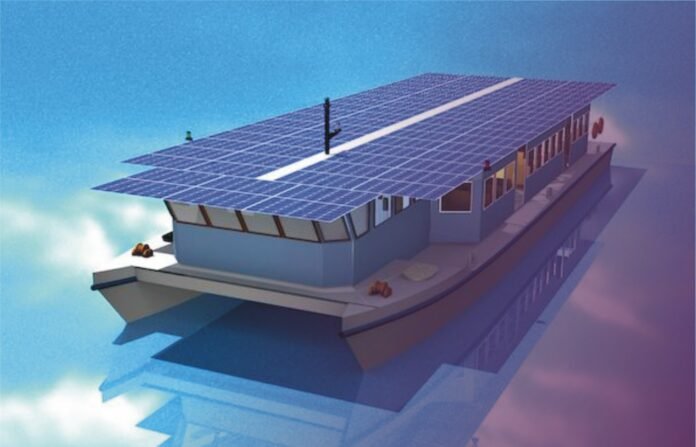Growing awareness of the environmental impact of traditional fishing methods has boosted the movement for sustainable fishing. Solar-powered fishing boats are a promising innovation. This clean, renewable energy source offers a convincing solution to Pakistan’s fishing sector’s problems.
The Solar-Powered Fishing Boat Promise
The use of solar power in fishing boats has shown promise. Studies on floating solar plants show that reservoirs, lakes, and oceans may host solar arrays. Solar boats are a sustainable alternative to diesel boats since they can harness sunshine in wide oceans. This integration works synergistically with hydropower facilities to reduce solar generation variability.
Overcoming Obstacles
The adoption of solar-powered fishing boats has challenges. Addressing water body availability, floating solar system stability and durability, and fishing infrastructure integration is crucial. Despite these obstacles, solar-powered boats have many advantages. As floating solar technology advances and the market grows, the fishing industry may lead in sustainability and environmental protection.
Learning from Global Models
India and the Philippines have moved toward solar-powered fishing boats. Kerala, India, is retrofitting traditional fishing boats with solar panels to reduce fuel expenses and environmental impact. Kerala’s subsidies and technical aid for fishermen are an example Pakistan can follow.
The Effect on Pakistan’s Fishing Industry
Pakistan’s fishing industry can benefit from solar technology, with over 26,000 registered boats. Solar-powered boats save money on diesel and engine maintenance and help the environment. Modernizing fish landing sites and infrastructure in Sindh and Balochistan, especially at Korangi and Kund Malir, can boost solar adoption. At least 20% of boats powered by solar can promote sustainable fishing, demonstrating renewable energy’s maritime potential.
Technical Matters
Boat size, deck area, fishing routes, and operational energy needs must be considered when integrating solar energy into fishing boats. Solar panels need proper design and installation to maximize sunlight and structural support. Real-time energy consumption and solar output monitoring, computer simulations, and performance assessments can assess system efficacy and reliability.
Pilot Projects and Future Outlook
Pakistani pilot programs can learn from India and the Philippines. These experiments have shown that high-efficiency monocrystalline panels, marine-grade solar panels resistant to saltwater corrosion, and lithium-ion batteries with high energy density and long cycle life work. A 10-meter fishing trawler with 30 square meters of solar arrays and a 60-kWh energy storage system may produce 6 kW.
Financial and Policy Support
Effective policy, regulatory frameworks, and financial instruments are needed to make solar-powered fishing boats viable. Kamyab Jawan, Akuwwat, and public-private partnerships can help fishing villages get inexpensive finance to convert or buy solar-powered boats.
Conclusion: Sustainable Future
Solar energy is essential to Pakistan’s sustainable fishing sector, which is complicated. Pakistan can lower its environmental impact, enhance fishing community livelihoods, and create a more sustainable and environmentally conscious fishing sector by adopting solar-powered fishing boats. Pakistan’s fishing sector may use solar electricity for a brighter, more sustainable future with support and commitment.



